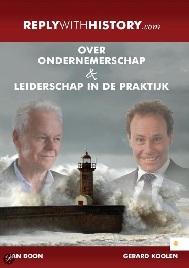veronika
71. Innovation in the genes
Dear Gerard
Until now, the way you organized your innovation process worked well. By controlling the innovation at the top of your organization you were able to coordinate the process well. A problem can arise when your business grows. How are you going to develop the process then? My son will soon be graduating from the University of Amsterdam (Information Science). This study focuses on the area between business and operational processes and specific software and IT companies. His thesis will be on an IT company which is active in the logistics and food sector. They have to implement a system so that all processes are more manageable. (more…)
70. Plenty of ideas, but …
Dear Jan,
The answer to your question of how we encourage innovations and whether we have a mechanism that continues to encourage innovation is very simple. These mechanisms are generally called Cristina and Gerard. Looking back, most innovations in the organization have come from Cristina and me (Cristina is a partner and Country Manager Romania and she has developed Lugera into the largest employment agency in Romania). And I think I know why this is.
First, I want to stress that this has nothing to do with any lack of creativity at all of other colleagues at Lugera. On the contrary. There is never a lack of good ideas amongst our team members. When having sessions on improvements, as a rule everyone knows what needs to be improved. It is just not always put into practice.
My teacher of Commercial Economy always said that marketing is one percent creativity and ninety-nine percent hard work. And I think this is the essence of innovation. There is no lack of ideas in the world. Most of people have great ideas in abundance. I think everyone has (had) ideas which are implemented by others later on. I often hear people say ‘I already had that idea, and look, somebody else is now carrying out my idea’.
Innovation is much less about the idea itself, but rather about the realization of the idea. Most ideas, however, remain only ideas and never get beyond the talking stage. It requires an enormous amount of effort and perseverance to make a new idea into a commercial success.
First,you need to overcome an enormous amount of negative resistance in your environment from colleagues, customers and suppliers. And colleagues are often the biggest negative force. Perhaps, because innovation brings more work, change and uncertainty with it. Second, the success of the innovation is always much later in coming than you imagined or planned, which makes many people give up. In the beginning there is enthusiasm, but the longer it takes the less enthusiasm. We, my colleagues and I, have started countless new things which in the end came to nothing. Third, the original idea has to be adapted in various ways and a high degree of flexibility and understanding is needed. The longer the implementation of the idea takes, the less people will support it. And fourth, I often notice that with the introduction of the idea and during the implementation most people simply do not see the possibilities and potential of the idea.
In short, there are plenty of great ideas. Money is of minor importance for innovation. Successful innovation is the result of hard work, perseverance, seeing opportunities and an unshakeable confidence in yourself and the idea. Passion and focus (and stubbornness) are required. I do not think that governments have a role in encouraging innovation. As a rule, government money achieves little and is wasted in this area.
Regards
Gerard
69. The innovation engine: SMEs or government?
Dear Gerard
You have your company well organized. The best people and the best selection of customers is not easy to achieve. In addition, it is also important to monitor your information sources well. And this is not easy, even the NSA and the Dutch security service has had its problems with this! Well done, it deserves great respect. (more…)
68. Birds of a feather, flock together
Dear Jan
Thanks for the tip! Over the past 18 years, only once has an employee started up on his own and tried to take a client with him. He didn’t succeed and that customer remained loyal to us. (more…)
67. Light at the end of the tunnel
Dear Gerard
It’s good to hear that in Eastern Europe the demand for labour is growing rapidly. This is a confirmation that the recovery from the crisis is continuing. The signals from the World Bank and the IMF and a number of economies are already more positive. Does this mean we can start to take it easier? No, certainly not. Growth in countries such as France and the Netherlands is fragile. In France, the problems are more urgent. Structurally, very little has been done. Labour costs are much higher than in Germany and the unions are extremely powerful. It is almost impossible to fire staff, people take to the streets because the retirement age was raised from 63 to 64, while 67 is the norm in neighbouring countries. Unrest in Ukraine and Syria also remain negative signals for the world economy. (more…)
66. Help, we are growing
Dear Jan
Well, Ukraine and Russia. I think the Ukraine badly needs Russia. I think the economy in Ukraine without the Russian companies and investments would be in total chaos and probably be even more corrupt than it is now (please do not have the EU transfer € 11 billion to Ukraine because this money will go directly into the pockets of the individual government officials, as is common in almost the whole of Eastern Europe). Besides, we have an office in Donetsk and because of all this political wheeling and dealing we face big challenges. The Ukrainian Hrivna dropped from 7 to 18 (for 1 euro). (more…)









